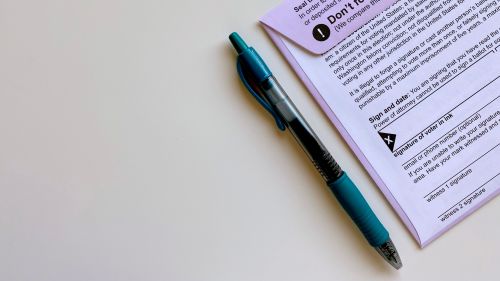The Polarization of Absentee Ballots

Over half of Americans are in favor of permanently changing laws to allow everyone to vote by mail, but there are partisan divides between Republicans and Democrats.
One topic that has become newly polarized over the course of this election cycle is absentee ballot voting. According to an NBC/Wall Street Journal poll conducted in April, over half (58%) of Americans are in favor of permanently changing laws to allow everyone to vote by mail. However, there is a very large partisan divide with only 31 percent of Republicans agreeing, compared to 82 percent of Democrats.
A Pew Research study conducted in June also found similar results when they looked at support for so-called “no excuse” early voting, or voting early without requiring a documented reason. Thirty-four states, as well as Washington D.C., already allow no excuse early voting. However, the recent tension around absentee ballots and early voting has caused many states to reexamine their early voting laws. The Pew poll found that among Democrats and Democratic-leaning independents, an overwhelming majority (83%) support no excuse early voting compared to only 44 percent of Republicans and Republican-leaners. Furthermore, among the remaining 55 percent of Republicans who think a documented reason should be required to vote early, 37 percent say the COVID-19 pandemic should not be considered a valid reason, while only 17 percent think it should be a considered a valid reason.
These differences go to the very core of what people think maintains the security of elections. Nearly eight in ten Democrats (79%) believe that changing election rules to make absentee ballot voting more available would make it easier to vote and would not jeopardize the security of the elections. A majority of Republicans (59%) disagreed, saying that making voting easier would have an effect on election security.
This partisan framing of this issue is a recent occurrence. This year, polls showed that over half (62%) of Democrats planned to vote early, while only 28 percent of Republicans planned the same. Historically, this partisan difference has been no more than about two percentage points. Additionally, in the past, differences in opinions on this topic were driven mostly by geographic location rather than party affiliation, with people who live in the western states being much more likely to vote by mail.
However, President Trump’s strident opposition to absentee ballot voting has turned this once uncontroversial electoral mechanism into an especially polarizing topic. For months now, President Trump has criticized the usage of absentee ballots, claiming that they will cause the presidential election to be fraudulent. Since Joe Biden was projected to become the 46th president of the United States, Trump’s crusade against absentee ballots has only become more forceful. In the past weeks he has also attacked the reliability of voting machines, promoted several baseless claims of voter fraud, and repeatedly alleged that the election was rigged.
At this time, multiple legal suits in multiple states have been brought by the Trump campaign claiming that some part of the absentee ballot process – be it the collecting, processing, or counting – was handled fraudulently. In almost all cases, these suits have been lost or dropped. So far, Republican leaders as well as Trump supporters have mostly backed the President in his legal efforts, while his Democratic opponents believe them to have no standing. With political animosity and unfavorable impressions of the opposite party rising to extremely high levels, it is clear that absentee ballots are just the latest victim of growing partisan rancor within the country.